- Home
- Alton Gansky
The Fog Page 6
The Fog Read online
Page 6
Fortunately, we started on the top floor, so the roof was only one full flight of stairs away. When we reached the upper landing, I saw a metal door that bore a plastic sign telling us this was the roof access. FOR USE IN EMERGENCIES ONLY.
I think our situation qualified.
The night air was cool, but I couldn’t detect even a hint of a breeze. We propped the door open to make sure it couldn’t lock behind us. We were probably being paranoid, but paranoia was understandable today.
I looked around. The roof was flat and covered with something that looked like black rubber flooring. Concrete paths led in several directions. One led to roof-mounted machinery, another to what looked like small rooms, and one to the edge of the building. The same kind of concrete walk ran the perimeter of the building. I assumed the walkways were there to keep maintenance people from walking on the rubber-like surface. Krone confirmed my suspicions. He then pointed out a few details.
“The walkway runs around the edge of the building. It’s there for the window cleaners.” He pointed to a short wall at the edge of the building. “There are anchors to support davits—small crane-like devices—along the parapet. The crews place the davits where they need them. It allows them to swing a window cleaner’s platform over the edge of the building.”
He pointed to some large mechanical equipment. “Much of the HVAC equipment is up here. Those small buildings you see are elevator equipment rooms.”
“You mean like pulleys and stuff?” I asked.
“Yes, and more. This building is too tall to use hydraulic elevators, so we use an electric system. The cars are pulled up and lowered on cables.”
It was all interesting and a great way to stall, but the time had come to do what we came for. I moved to the edge of the building until I was standing next to the wall Krone had called a parapet.
The light up here came from emergency lights and a veiled moon. I could see more stars than I expected in the downtown area of a major city. With the city lights out, there was almost no light pollution.
Fog reached as far as I could see in the dark city. I remembered the people on the streets we had seen from the limo: the partiers, showgoers, business people, and homeless. I tried not to think how many were now dead or how they died.
The professor groaned at the sight of the teeming fog. I leaned over the parapet and studied it. Now and again, one of those things would poke its head up, and each time the sight of its ugly face turned my stomach. Maggots looked better.
“I can barely see the green band,” Andi said. “The fog must be higher than the thirteenth floor.”
Krone nodded. “I’d estimate the fog is up to the twenty-fifth floor.”
“So halfway, then.” It seemed higher to me.
“More than halfway, Tank,” the professor said. “Remember, only forty-eight floors are above the ground.”
“That doesn’t make me feel any better.”
As we watched, the fog rose another few feet. It was definitely growing faster, bringing death with it.
“I’m gonna take a lap.” I walked next to the parapet, my gaze shifting from the fog below to darkness everywhere else. As I walked west I noticed I couldn’t see the waters of the bay. Even the ocean wore a blanket of fog. I’ll confess, I was losing heart, which is sad, since I’m supposed to be the optimist of the group.
I followed the concrete path around the edge of the building. I could hear the others behind me. They spoke on occasion, but barely above a whisper. They were as stunned as I was.
Behind the building was a gap. Another building, dark as a tomb stood on the other side of the gap. The fog was as high here as it was at the front of the building. Why wouldn’t it be? It was fog.
“Alley,” Krone said. “There’s a narrow alley behind the building. If memory serves, it’s about twenty feet wide.”
Good to know, but useless. I had hoped there was a back way out, a place without the fog. It was a ridiculous hope, but then this whole thing was ridiculous.
We made our way back to where we started. “We’re stuck,” I said. I studied the fog more intently. A creature popped its grotesque head up and stared at me. Then it pointed at me. It’s probably my imagination, but for a moment I thought it smiled.
Andi gasped. I snapped my head around and saw her staring across the street at the building opposite the one we were on. It was tall like Krone’s building, but three or four stories shorter. It looked fairly new. Like many buildings in San Diego, it looked made of glass.
The lights had gone on. Not emergency lights. All the lights in it. I looked at other buildings. All dark. I leaned over the parapet and looked down the side of our structure. Still dark, except for the green band.
“What’s going on—” Then I saw. Dear Lord, I didn’t want to see. The lights inside the building illuminated everything, but all I could see was fog. Fog inside the building. And in the fog, people running, and unpeople swimming—attacking. Blood painted the windows.
I couldn’t watch.
“Did you see?” The professor said.
“We all saw, Professor. Horrible.”
Andi covered her mouth. “I’m going to be sick.”
“I meant the fog. The fog inside the building. It’s at a higher level than the fog outside. That means . . .”
He didn’t finish and I was glad. We knew what it meant.
The lights across the street flickered then winked out. We couldn’t see inside. That was the only blessing of the moment.
Then we heard a scream. No, not a scream—several screams. I sprinted to the stairwell. The professor was close behind.
CHAPTER
8
Screams from a Stairwell
I pounded down the stairs and rounded the middle landing. There were too many things to see. My brain quivered. First I noticed a half-dozen people standing on the landing by the door to the floor we had been on most of the night. It looked like they were cons making a prison break. My guess was they saw the slaughter across the street and panicked.
Then I saw several more people standing on the first flight of stairs going down. They stopped in midstep, no doubt frozen by the screams of those who had gone before.
I saw one other thing: Brenda, sitting half on the landing, half on the first step down. Daniel was in her arms. He was shaking.
“Back into the room!” My voice echoed in the stairwell.
Those on the platform turned and stared at me. I descended the remaining steps. No one had moved. “I said, get back in the room.”
One guy, a six-footer in his thirties, sneered at me. He should see what linemen do. “Who do you think you are to give orders?” He poked me in the chest with his index finger. At the moment I wasn’t sure if he was brave or stupid. It didn’t matter. I had to put an end to the panic, and I could only think of one thing to do, so I did it.
I seized the front of his dress shirt, just above his fancy vest, pulled forward and, when he tried to resist my pull, pushed back and up, pinning him against the doorjamb.
“Okay, mister. Here’s the deal. You’re scared. I’m scared. The difference is I’m younger, stronger, and twice your size. Am I getting through to you?”
He nodded.
“Good. I’m trying to help.” I lifted him another two inches. “So don’t get in my way. We good?”
“Y-yes.”
I dropped him and took a deep breath.
“Everyone, please go in the room. Right now it’s the safest place to be. There’s nothing but death down these stairs.”
One by one they filed back into the room until only Brenda and Daniel were left. I squatted next to them. “You okay?”
“They went nuts. They saw the lights go on the building across the street. They cheered and moved to the windows. Then the slaughter began. They lost it, Cowboy. I mean they went bug nuts and made a run for the stairwell.” She grimaced. “Daniel tried to stop them, but they knocked him down. I had to get him to safety, but they kept pushing towa
rd the door. We got carried along. I was afraid they were gonna trample us. If you hadn’t—”
“That part is over,” I said. “Are you hurt?”
“My leg is banged up. Kneecap. I think it’s broken.”
“Let me have a look.” The professor inched by me onto the stair just below Brenda. Brenda didn’t object. They bicker a lot, but I have no doubt either would lay down their life for the other.
“It hurts here?” He pressed the area just below her kneecap. Her yelp was enough of an answer. He studied the leg a little longer, pressed a few more spaces, but stopped when Brenda smacked him on the shoulder. “Her arm is working.”
“So is my fist,” she snarled.
The professor looked at me. “She’s right. I think the patella is broken. That’s a guess of course.” He looked behind him and down the stairwell. He let his eyes linger. “I’d feel safer inside with the others. Not much, but a little.”
I lifted Daniel from Brenda’s embrace. “Hey, dude. Are you okay?”
“Yes.”
“No injuries, broken bones, bruises, missing limbs?”
He smiled. “No.”
“I think you may have saved a bunch of lives. Go with Andi, buddy. I’m gonna give this mean ol’ woman a hand up.”
“Hey,” Brenda said. “You heard me tell the professor that my fists are still working.”
That’s the Brenda I admire so much.
“Help me up,” she said.
“Nope.” Instead, I scooped her up in my arms. She cringed and swore—something she’s really good at. She wrapped her arms around my neck, and I carried her into the room.
The expansive room was close to silent. Something was different. I found the professor, Andi, and Daniel standing near the door, which closed behind me.
“There are less people here,” I said to whoever was listening. “How many made it down the stairs?”
Brenda said, “I don’t know. Ten, maybe.”
“That doesn’t make sense. There’s more than ten missing.”
“Cowboy . . .” Brenda looked me in the eye, her voice soft, but soaked with sadness. “There’s more than one emergency staircase.”
“Blessed Jesus.” I closed my eyes. “Why did I go to the roof?”
Andi laid a hand on my arm. “Because this is what we do, Tank. This is our calling. To do our best to fix things. Besides, you can’t save everyone.”
Nice words, but not cool enough to extinguish the fire of guilt in my gut.
I waited for the professor to huff as he usually did when any of us talked that way. The huff never came.
Brenda stiffened for a moment and then stared at her injured leg. “Cowboy, put me down.”
“Let me carry you to a chair.”
“Put me down now.”
I lowered Brenda until her feet could reach the floor. She wiggled from my arms and stood on both legs. She bent the one with the busted patella.
“I’m not sure that’s wise.”
“Shut up, Cowboy.” She tested her leg by bending it as much as her dress would allow. Then she pressed the area just as the professor had.
“No pain.” She straightened. “It’s like nothing happened.” She shot forward and hugged me. Then stepped back. “If you tell anyone I just did that, I’ll deny it.”
“You mean—”
“Yep. You healed me.”
I shook my head. “Someday I’ll get that figured out.”
“I’m missing something,” Andi said. The professor and I were pacing the room with her. Andi does some of her best thinking on her feet. “I’m missing something. I’m missing something.”
Yes, she was being redundant, but telling her that wouldn’t help anything. Then she stopped suddenly. I grabbed the professor’s elbow. He was lost in his own thoughts.
“What?” I asked Andi.
“Nothing. Probably nothing. Maybe nothing. I need to see Krone.” We gathered up the professor and went looking for the architect.
We found him at the bar drinking coffee. His wife was by his side. He looked worse than before we went on the roof. Janice looked even more concerned.
“Mr. Krone, may we have a moment?” Andi asked.
“You know, the only satisfaction I have at the moment is this: when one of those creatures bites into me, he’s gonna get a mouthful of chemicals.”
I didn’t expect that. “I don’t understand, sir,” I said.
“Cancer. I know you’ve been wondering. I’ve got only a few months to live. Given the circumstances, I may be robbed of those.”
“I’m sorry to hear that, sir.” I was. Now I really felt bad about my erratic gift of healing. “But this isn’t over yet, Mr. Krone.”
“Are you sure?” He studied his coffee as if he could read the future in it. “I don’t see any way out of this. I know what I saw. I don’t believe it, but I know it’s real. Does that make sense?”
Andi answered. “Believe it or not, sir, that makes perfect sense. If you knew us better, you’d know why.” She manufactured a grin. He didn’t look up, so he missed Andi’s brave face.
“Can I join the party?” Brenda and Daniel had been standing a short distance away. She had been testing her newly healed leg. I didn’t know how to feel. I was happy for Brenda but felt a truckload of guilt about Krone.
Krone looked at her, then at Daniel. He stretched forward a thin hand and patted Daniel on the head. Daniel, who didn’t warm to strangers easily, allowed it.
“You know, I’ve created mansions, hospitals, and high-rises around the world. I’ve used my mind and skills to create important buildings, but one creation has eluded me.” He looked at his wife. “A child. We weren’t able to have children.”
Tears glistened in Janice’s eyes. I could see the depth of their pain.
“No children. No grandchildren.” He turned back to his coffee.
I’ve met depressed people before. The professor has been known to live in the dark from time to time, but I don’t think I’ve ever watched someone sink deeper and deeper into depression. It was like watching a man drown.
“Mr. Krone,” Andi said, “I hurt for you. I know your pain is great, but I need your help.”
“There’s nothing I can do for you. Nothing I can do for my wife. Nothing I can do for anyone here.” Janice touched his arm, but kept silent.
“Mr. Krone, I want to—no, I need to ask a few questions. Will you help me?”
Krone sighed and straightened as if getting ready to exert himself. “What do you want to know?”
Andi took a deep breath. “When I was on the roof, I looked over the edge like everyone with us, and like everyone, my attention was fixed on those ugly things swimming in the fog, and the . . . what happened in the other building. Now it occurs to me that I saw something else. A green glow below the fog.”
“The horizontal element.” Krone picked up on the fact that we had no idea what he was talking about. “It’s part of the exterior design, like the arched entryway. The bulk of the building is blocky; those elements break up the stark lines of the building. In architecture we call it gingerbread—stuff added to the building’s exterior to make it pleasing to the eye, to make it noticeable and memorable. It’s also part of the interior design.”
“So the green band is exterior glass like the rest of the façade?”
“Yes. It projects from the plane of the front by one foot to create a pleasing shadow line.”
I didn’t know what a shadow line was, but I didn’t interrupt.
Andi nodded then cocked her head to the side. If we weren’t all going to be monster chow, I would have considered it cute. Her head snapped up. “It’s on the same electrical system as the rest of the building?”
“Of course,” Krone said.
“They why did I see a green glow?”
Krone shrugged. “Emergency lights.”
“Forgive me, Mr. Krone, but there are emergency lights on this floor and every floor. I don’t think they would make the
fog glow the same way the . . . what did you call it? Gingerbread? Horizontal element?”
“Maybe you just imagined it,” Krone said.
“She didn’t,” the professor said. “I’ve known her for a long time. If she said she saw it, then she saw it.”
“I saw it, too,” I piped up. “When I was on the roof.”
“I have another question,” Andi said. “That green band is at the thirteenth floor?”
“Yes, but—”
“I’m not being superstitious, Mr. Krone. On our way up the elevator, I noticed that there was no button for the thirteenth floor. Is that to make visitors more comfortable?”
“No. Not at all. I know there have been those who label the thirteenth floor as fourteen, but we’ve never done that. People aren’t that superstitious anymore.”
“Then why is there no access from the elevator?”
“The space isn’t rentable. Much of the building’s heating, cooling, electrical, and similar systems are on that floor. Of course, some of it has to be roof-mounted, but we’ve found a way to make utilities more efficient if placed in the lower third of the building. Well, Jonathan Waterridge made all that work. I specialize in design; he specializes in mechanical matters in buildings. The man is brilliant in that area. Far more than I. Just like Ebony Watt excels in interior design.”
Andi pressed on. “The name of the building is Portal Bayfront Plaza. Why that name?”
“Marketing, mostly.” Krone said. “Buildings need to sound attractive, as well as look beautiful. We’re close to the bay, so Bayfront. The bay is a port, so portal.”
That made sense to me. It didn’t make sense to Andi. “If that’s the case, Mr. Krone, then the name should be Port Bayfront Plaza—not Portal.”
Krone stared at her a minute. So did I. I wasn’t following her logic. Lucky for me, Andi jumped right into an explanation:

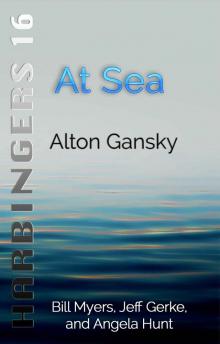 At Sea (Harbingers Book 16)
At Sea (Harbingers Book 16)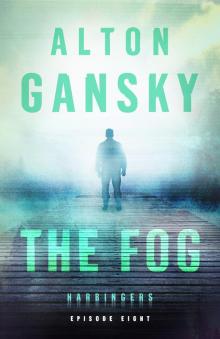 The Fog
The Fog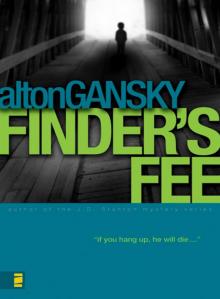 Finder's Fee
Finder's Fee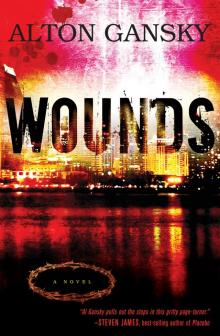 Wounds
Wounds End Game (Harbingers Book 20)
End Game (Harbingers Book 20)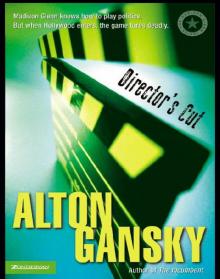 Director's Cut
Director's Cut Zero-G
Zero-G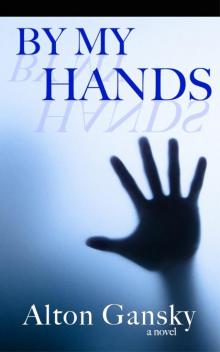 By My Hands
By My Hands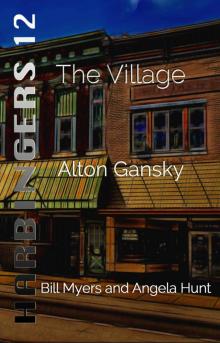 The Village (Harbingers Book 12)
The Village (Harbingers Book 12) Beneath the Ice
Beneath the Ice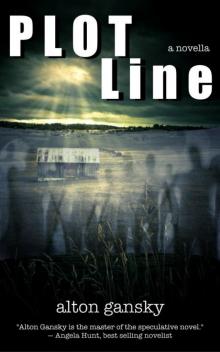 Plot Line
Plot Line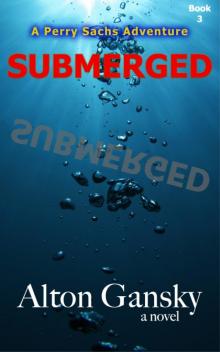 Submerged
Submerged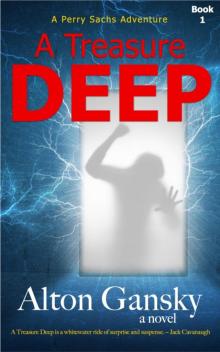 A Treasure Deep
A Treasure Deep